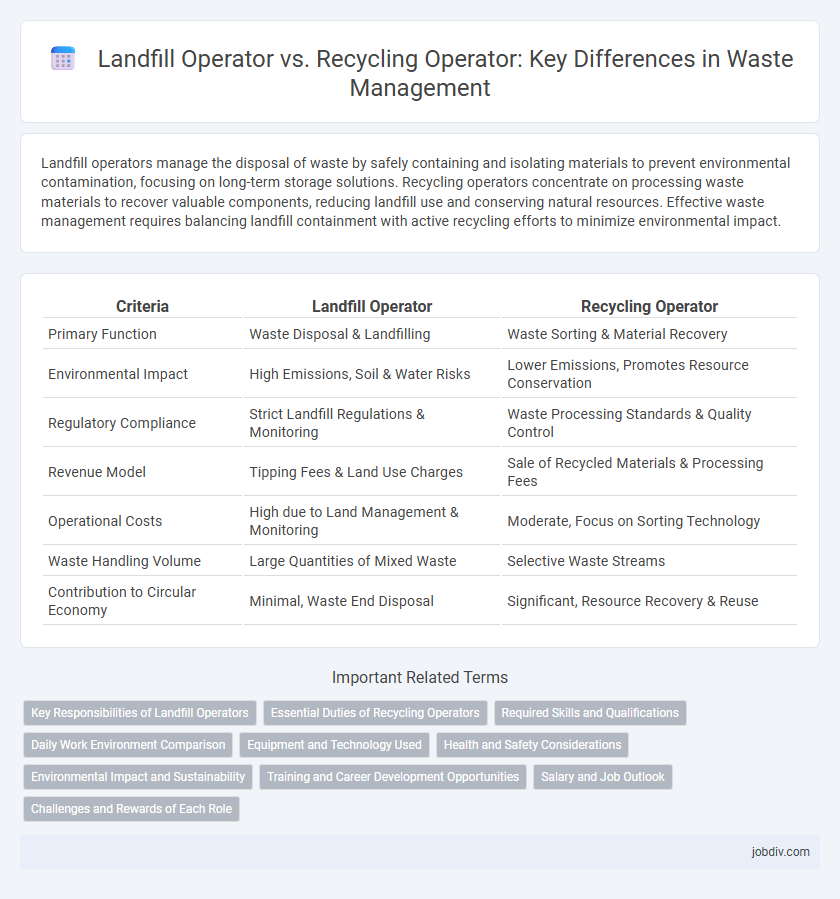Landfill operators manage the disposal of waste by safely containing and isolating materials to prevent environmental contamination, focusing on long-term storage solutions. Recycling operators concentrate on processing waste materials to recover valuable components, reducing landfill use and conserving natural resources. Effective waste management requires balancing landfill containment with active recycling efforts to minimize environmental impact.
Table of Comparison
| Criteria | Landfill Operator | Recycling Operator |
|---|---|---|
| Primary Function | Waste Disposal & Landfilling | Waste Sorting & Material Recovery |
| Environmental Impact | High Emissions, Soil & Water Risks | Lower Emissions, Promotes Resource Conservation |
| Regulatory Compliance | Strict Landfill Regulations & Monitoring | Waste Processing Standards & Quality Control |
| Revenue Model | Tipping Fees & Land Use Charges | Sale of Recycled Materials & Processing Fees |
| Operational Costs | High due to Land Management & Monitoring | Moderate, Focus on Sorting Technology |
| Waste Handling Volume | Large Quantities of Mixed Waste | Selective Waste Streams |
| Contribution to Circular Economy | Minimal, Waste End Disposal | Significant, Resource Recovery & Reuse |
Key Responsibilities of Landfill Operators
Landfill operators manage waste disposal by overseeing site operations, ensuring proper waste compaction, and maintaining environmental compliance through monitoring gas emissions and leachate treatment. They are responsible for daily site inspections, managing equipment, and ensuring adherence to strict health and safety regulations. Unlike recycling operators who focus on sorting and processing recyclable materials, landfill operators prioritize safe containment and regulatory compliance to minimize environmental impact.
Essential Duties of Recycling Operators
Recycling operators manage the collection, sorting, and processing of recyclable materials to reduce landfill waste and promote environmental sustainability. Their essential duties include inspecting materials for contamination, operating machinery to separate and prepare recyclables, and ensuring compliance with environmental regulations to optimize material recovery rates. Efficient recycling operations decrease landfill volumes, conserve natural resources, and support circular economy initiatives.
Required Skills and Qualifications
Landfill operators must possess strong knowledge of environmental regulations, heavy machinery operation, and site safety protocols, often requiring certifications in hazardous waste management and equipment handling. Recycling operators need expertise in sorting technologies, material identification, and quality control, with qualifications typically including training in waste stream management and environmental sustainability practices. Both roles demand physical stamina, attention to detail, and a commitment to compliance with health and safety standards.
Daily Work Environment Comparison
Landfill operators manage waste disposal sites by overseeing compacting, covering, and monitoring landfill cells to ensure environmental compliance and operational safety. Recycling operators work in sorting facilities, handling materials like plastics, metals, and paper, utilizing machinery and manual labor to separate recyclables for processing. Daily tasks for landfill operators involve heavy equipment operation in open outdoor environments, while recycling operators experience faster-paced, indoor facility work with emphasis on material identification and segregation efficiency.
Equipment and Technology Used
Landfill operators primarily use heavy machinery such as bulldozers, compactors, and excavators to manage waste placement, cover materials, and maintain site stability. Recycling operators deploy advanced sorting technologies including optical sorters, air classifiers, magnetic separators, and conveyor systems to efficiently separate and process recyclable materials. Modern recycling facilities increasingly integrate automation and AI-driven robotics to enhance throughput and material recovery rates compared to traditional landfill equipment.
Health and Safety Considerations
Landfill operators face significant health risks due to exposure to toxic gases like methane and potential landfill fires, requiring stringent gas monitoring and personal protective equipment (PPE) protocols. Recycling operators encounter hazards from handling sharp materials and exposure to airborne contaminants, necessitating effective dust control and mechanical safeguards. Both require comprehensive safety training and emergency preparedness to mitigate occupational illnesses and injury risks.
Environmental Impact and Sustainability
Landfill operators contribute significantly to environmental degradation by releasing methane, a potent greenhouse gas, and risking soil and groundwater contamination through leachate leakage. Recycling operators reduce waste sent to landfills, conserving natural resources and lowering carbon emissions associated with raw material extraction and processing. Emphasizing recycling operations enhances sustainability by promoting circular economies and minimizing landfill dependency, which is essential for long-term environmental health.
Training and Career Development Opportunities
Landfill operators typically undergo training focused on site management, safety protocols, and environmental regulations to ensure proper waste disposal and contamination prevention. Recycling operators receive specialized education in material sorting technologies, sustainability practices, and resource recovery techniques, offering broader career advancement in environmental management and green technology sectors. Both roles provide certification programs, but recycling operators often access more diverse pathways for professional growth due to the industry's expansion in circular economy initiatives.
Salary and Job Outlook
Landfill operators typically earn an average salary ranging from $35,000 to $50,000 annually, with moderate job growth projected due to ongoing waste management needs. Recycling operators, on the other hand, often experience salaries between $30,000 and $45,000, but benefit from a stronger job outlook driven by increasing environmental regulations and sustainability initiatives. Employment opportunities for recycling operators are expected to grow faster than landfill operators, reflecting a shift toward more eco-friendly waste processing methods.
Challenges and Rewards of Each Role
Landfill operators face challenges such as managing environmental risks, controlling odors, and ensuring regulatory compliance, yet benefit from stable employment and critical roles in waste containment. Recycling operators tackle the complexity of sorting diverse materials and maintaining efficient processing lines, rewarded by contributing to sustainability and resource conservation. Both roles demand technical knowledge and offer opportunities to impact waste management systems positively.
Landfill Operator vs Recycling Operator Infographic

 jobdiv.com
jobdiv.com